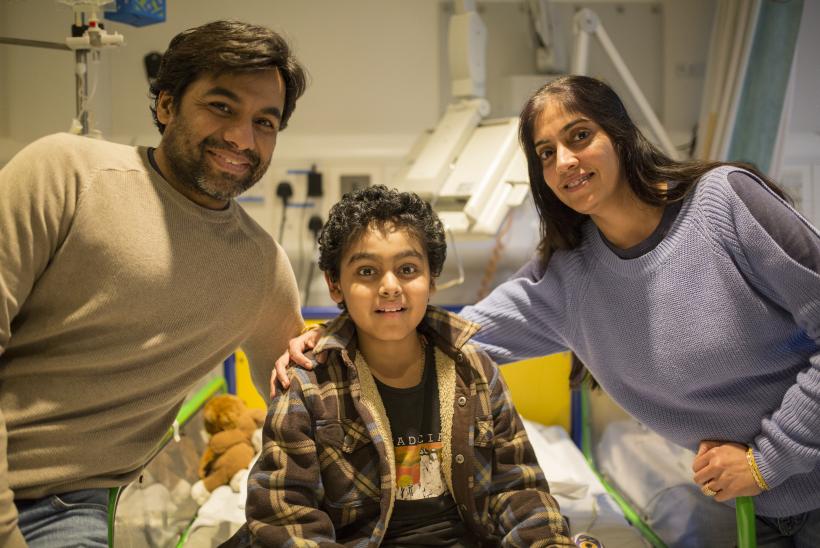A Decade of Innovation at GOSH
We are committed to providing better treatment and cures for children with complex and rare conditions around the world through research and innovation. In partnership with UCL Great Ormond Street Institute of Child Health (ICH), we form part of Europe’s largest academic centre for research and education in children’s health and disease.
Join us as we look back at 10 years of innovation!
2010
GOSH and the ICH launched a research programme that set out to discover the genetic basis of rare diseases – called GOSgene.
So far 34 gene defects have been identified, which could pave the way to better diagnosis and treatment for children with rare diseases in the future.
GOSH became the first hospital in Europe to offer an imaging technique called fMRI for children with epilepsy.
This imaging technique allowed our doctors to make detailed maps of the nerve pathways that make up the brain and plan the safest and most effective surgery for the children that need it.
GOSH became the first hospital in Europe to offer home dialysis for children with kidney conditions.
Before home dialysis, children and their families had to come into hospital three times a week for four hours at a time. Home dialysis gives children with kidney diseases much more freedom and has dramatically increased their quality of life.
2011
GOSH was part of a cross-European team that discovered that high dose chemotherapy was more effective for children with neuroblastoma.
Dr Penelope Brock was part of the cross-European team that found that high dose chemotherapy was more effective for children with an aggressive form of cancer called neuroblastoma. The study has changed the way that doctors across the world treat neuroblastoma and will mean that fewer children lose their lives to the disease each year.
2013
Professor Waseem Qasim developed a new technique that could allow more children to receive bone marrow transplants.
The new approach could allow children who cannot find a perfect donor match to safely receive life-saving transplants.
Dr Veronica Kinsler discovered the genetic cause of a condition called CMN (congenital melanocytic naev).
Dr Kinsler’s finding could lead to earlier diagnosis, better treatments and ultimately brighter futures for children with CMN.
Youkang Huang came to GOSH from China at the age of one with a rare genetic condition called CMN which he had suffered from since birth. "This hospital is a blessing!" HuaJuan, his mother said "It is very pleasant, and everyone is very friendly. I have the utmost trust in the hospital and the doctors here." Read more about Youkang’s story.
2014
Mr Nizam Mamode and his team at GOSH conducted the world's first kidney transplant in a child with HLA antibodies.
The team used a technique that removed any transplant-rejecting (HLA) antibodies, offering children a much improved and longer life.
Essa Lashkari, from Dubai, was the first ever patient to be treated with the new technique. “Essa required antibody removal so that he was able to receive his mother’s kidney. This was the first HLA incompatible kidney transplant in a child performed in the UK.” Dr Marks, Consultant Paediatric Nephrologist, explains. Read more about Essa’s story.
Professor Patricia Woo was part of a global team that showed a new treatment could benefit children with a certain form of arthritis.
The expert team – comprising scientists and doctors across the world – found that a drug called tocilizumab was effective in treating children with idiopathic arthritis.
2015
In a world-first, a one-year-old patient was cured of her leukaemia thanks to a gene editing technique used by Professor Waseem Qasim.
He designed a new treatment that uses ‘molecular scissors’ to edit genes and create designer immune cells programmed to hunt out and kill drug-resistant leukaemia.
2017
A new genetic test, called Oculome, was developed by researchers at GOSH and the ICH.
The test helps to diagnose and predict a range of serious childhood eye conditions.
2018
GOSH surgeons working alongside University College Hospitals performed the first fetal surgery for spina bifida in the UK.
This pioneering surgery hopes to improve the quality of life of babies with spina bifida by operating while they’re still in the womb. Learn more.
HRH Duchess of Cambridge opens the Premier Inn Clinical Building, part of the Mittal Children’s Medical Centre, at GOSH
The new building has 8 new wards and new theatre space and is part of the 240-bed Mittal Children’s Medical Centre.
2019
An 11-year-old boy at GOSH became the first patient in the UK to be treated with a pioneering CAR-T cancer therapy on the NHS.
The therapy (Kymriah) involves modifying immune cells to target an aggressive blood cancer called B-cell acute lymphoblastic leukaemia. The treatment is also available for international patients. Tamin from Saudi Arabia was recently discharged from hospital after treatment. Learn more.
First use of pioneering phage virus therapy to treat patient with cystic fibrosis
A new treatment that uses a cocktail of naturally-occurring viruses to infect and destroy bacteria has been used for the first time to treat a fifteen year old patient. The GOSH team worked closely with experts on phage therapy from the University of Pittsburgh to develop this cutting edge treatment.
GOSH and UCL open the Zayed Centre for Research into Rare Disease in Children
The purpose-built Zayed Centre for Research brings together pioneering research and clinical care under one roof in a world-first that will help to drive forward new treatments and cures for seriously ill children from around the world. The Centre was made possible thanks to a transformative gift from Her Highness Sheikha Fatima bint Mubarak. Learn more about the Centre.


